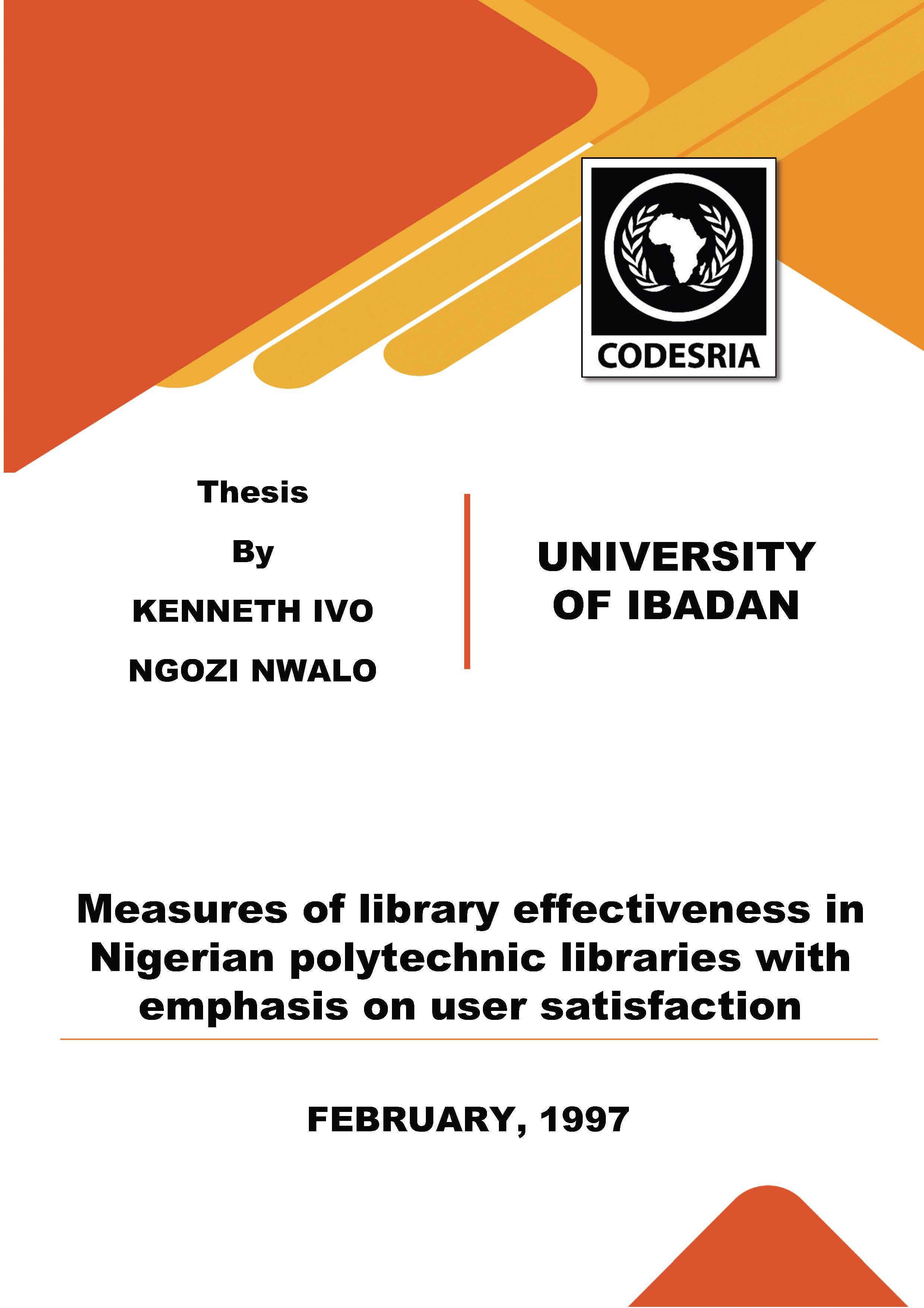Measures of library effectiveness in Nigerian polytechnic libraries with emphasis on user satisfaction
Mots-clés :
Measures, library, Nigerian polytechnic libraries, userSynopsis
The research objective is to explore how to improve the effectiveness of Nigerian polytechnic libraries with special emphasis on harnessing the strengths of the library effectiveness variables of interest - operational climate, library collections, tangible services and qualitative services. In furtherance of this, the study has measured the effectiveness of polytechnic libraries in Nigeria and ascertained the contribution of each of the four highlighted output variables to this effectiveness. User satisfaction was the measure of library effectiveness in the study.
In conducting this investigation, the survey research design was adopted with the questionnaire as the main instrument of data collection. There were three questionnaires validated by experts and pre-tests. The study population consists of 14 polytechnic libraries: the heads of the libraries, all their 97 professional and paraprofessional staff and 8,233 members of the user communities. All the library personnel and 89.3% of the users validly completed and returned their questionnaires.
The research data was analysed mainly by t-test, step-wise multiple regression analysis and correlation analysis. All tests were conducted at 0.05 level of significance.
The research findings show that:
I. Nigerian polytechnic libraries' are ineffective in meeting the information needs of the polytechnic community.
II. There is no significant difference beween the performance of the polytechnic libraries that are adequately staffed and those that are inadequately staffed.
III. User satisfiction as a measure of library effectiveness has revealed a highly significant positive relationship between Nigerian polytechnic library effectiveness and fonr performance indices - operational climate, library collection, tangible services and qualitative services. These variables are in order of their importance to library effectiveness as ranked in the research;
IV. Most staff and users of Nigerian polytechnic libraries are favourably disposed to the user approach to measurement of library effectiveness.
V. Measnrements of effectiveness of polytechnic libraries in Nigeria by the opinion of the library staff on the one had, and the users, on the other, based on the same parameters yielded significantly different results: the library staff have the tendency to overrate the effectiveness of the libraries.
VI. Nigerian polytechnic libraries, though highly utilised, are grossly neglected by their parent institutions in resource allocation.
The research has provided useful information on the management of polytechnic libraries in Nigeria. By identifying and establishing the importance of each performance variable, this study has provided a frame-work for policy-making and
resource sharing for greater library effectiveness.
The study recommends that commesurate attention be given to the fonr library variables in order of their hierachy of importance. It also calls for periodic measnrement of the polytechnic libraries effectiveness by user approach. The need to take urgent steps to rescue the polytechnic libraries from obsolescence and obliteration through greater resonrce allocation and better management in the overall interest of the polytechnics' missions was also highlighted.
Téléchargements
Références
STORY, D.B. (1979) "The role of community colleges in science, technology and management training in Nigeria". in Technological Development in Nigeria: A publication of the Nigeria - United States Workshop on Technological Development in Nigeria, Edited by Moyibi Amoda and Cyril D. Tyson - Lagos: Third Press
International. p 454.
WHITLATCH, J.B. (1987) Client/Service provider perceptions of reference service outcomes in academic libraries: Effects of feedback and uncertainty. Unpublished Dissertation, Ph.D. University of California, Berkley, p 388.
SELL, B. (1980) An evaluative, holistic and user-orientated approach to assessing and monitoring effectiveness of the academic library in its setting. In Library Effectiveness: A state of the Art. New York, Library Administration and Management Association, pp295-336.
ONONOGBO, R.U. (1992) "User expectations: a vision for library services in higher education in Nigeria," paper presented at a seminar organised by Committee of University Librarians of Nigerian University Libraries (CULNU), held at the University or Ibadan, Ibadan, 17th- l 9 .lune, p. l.






